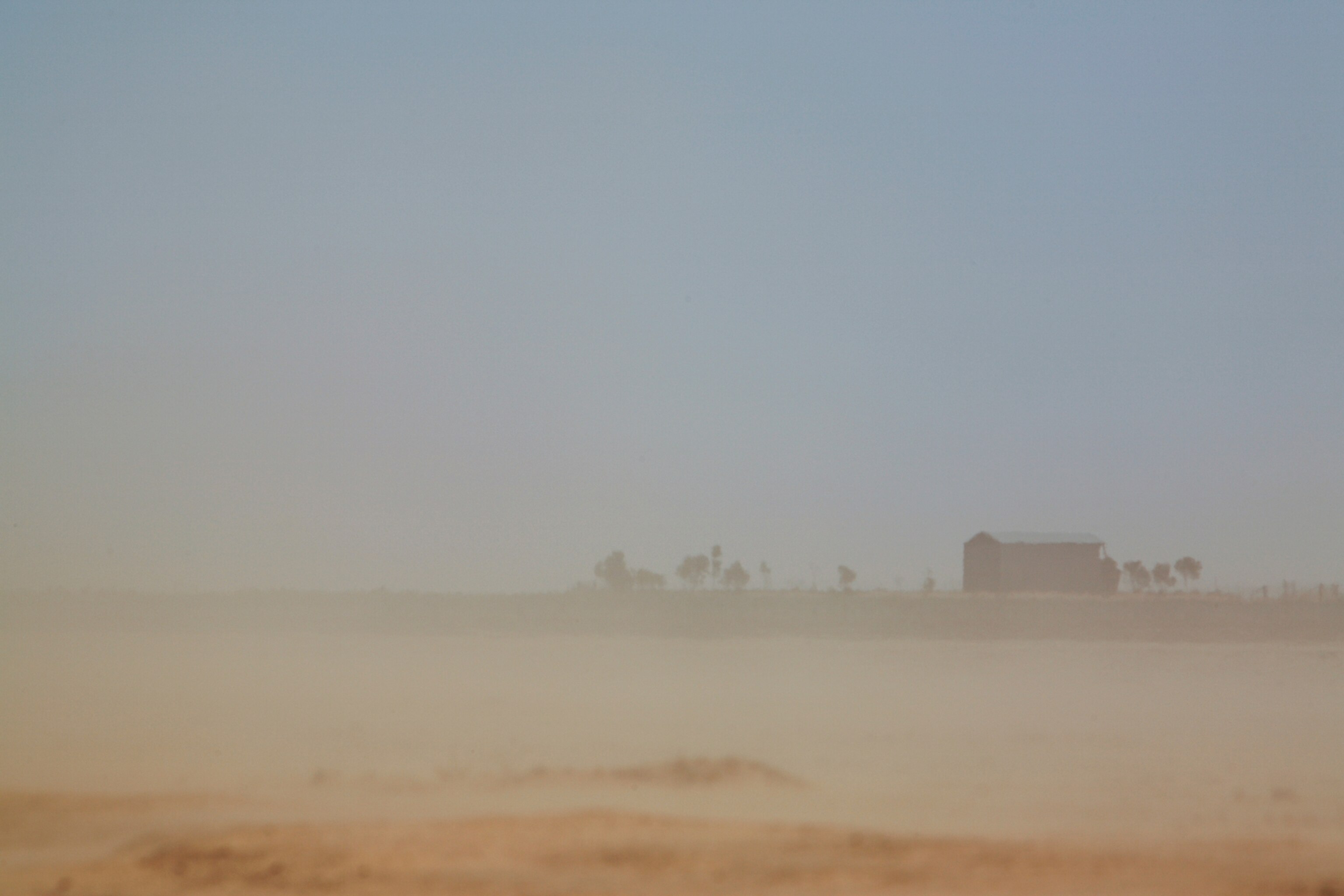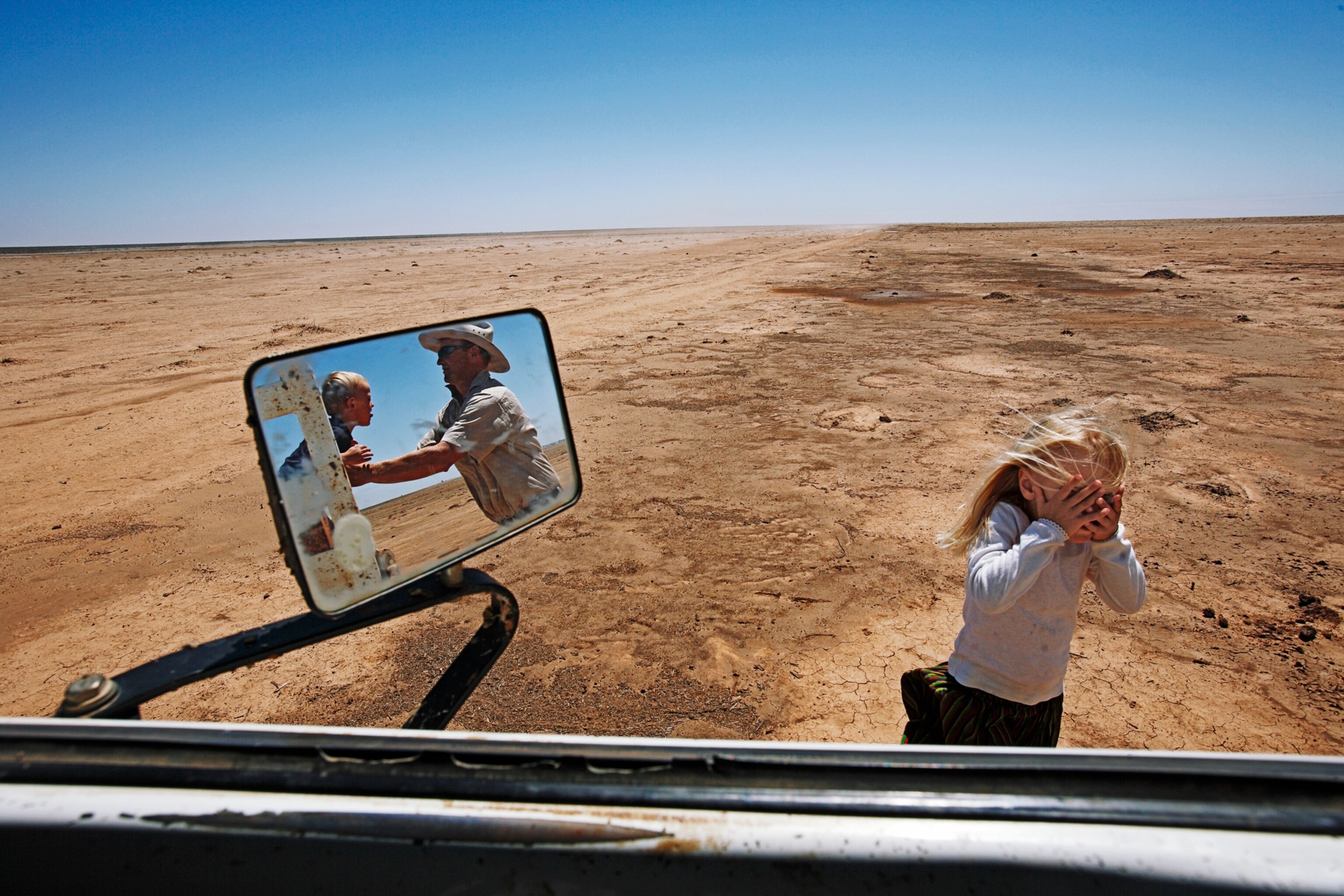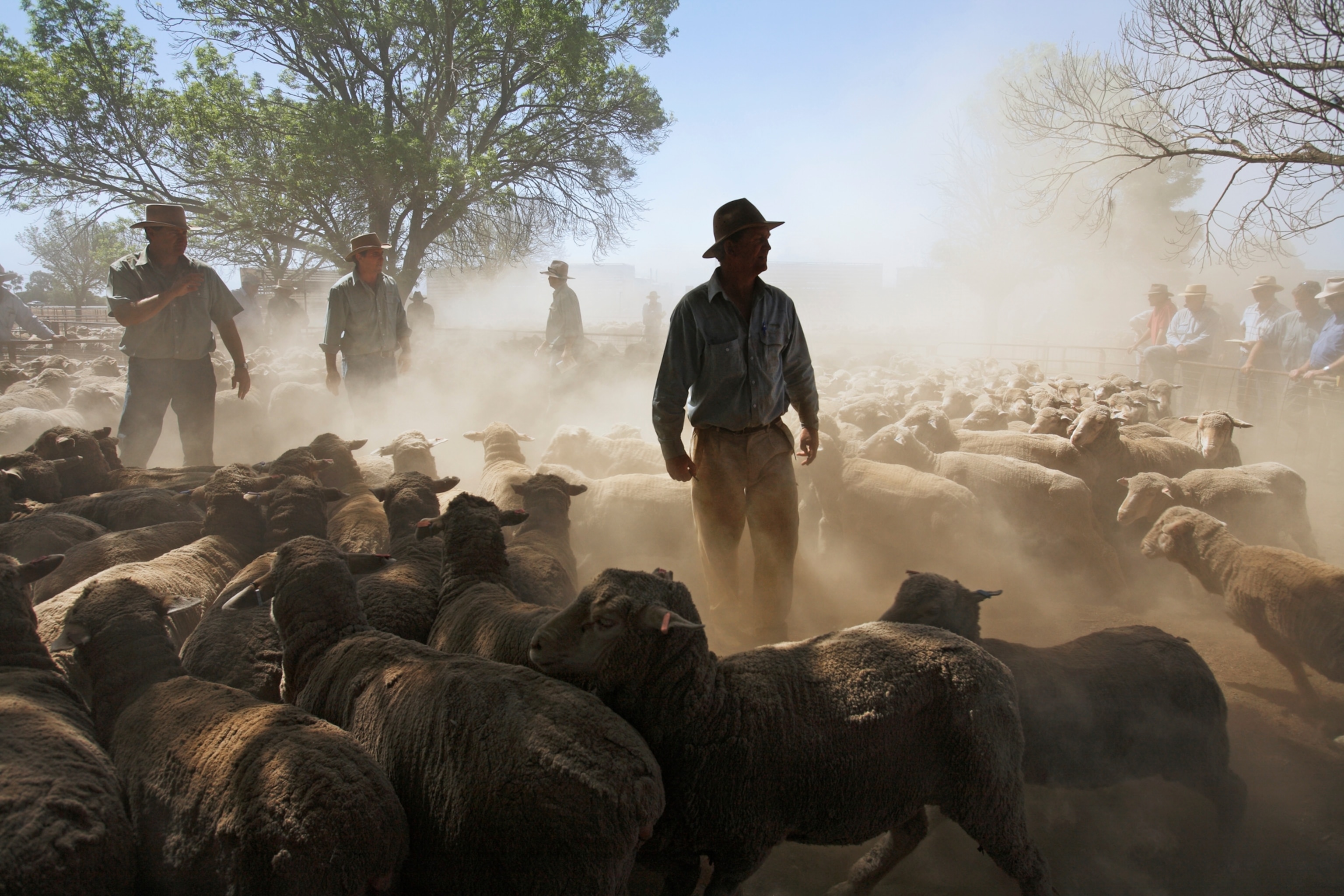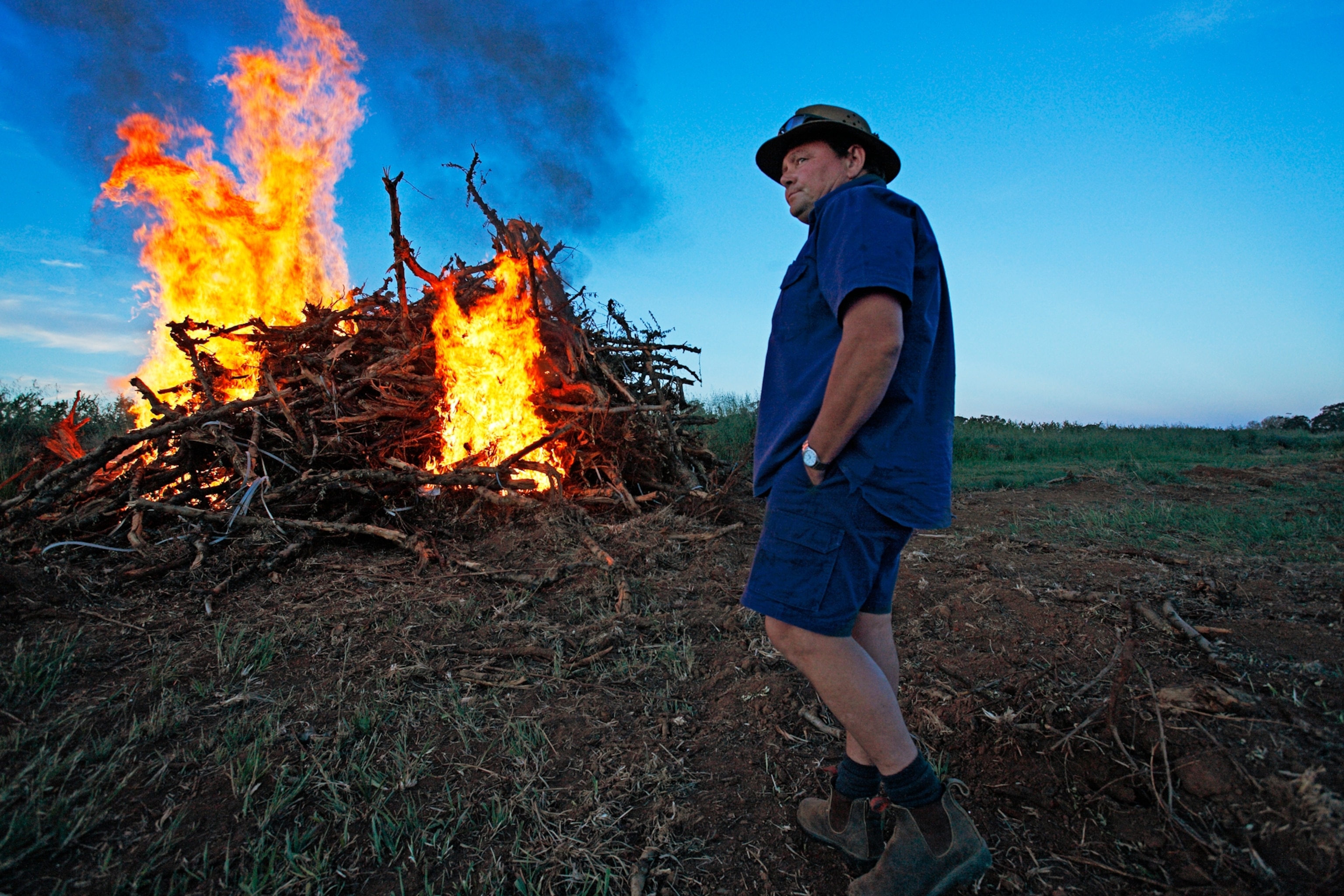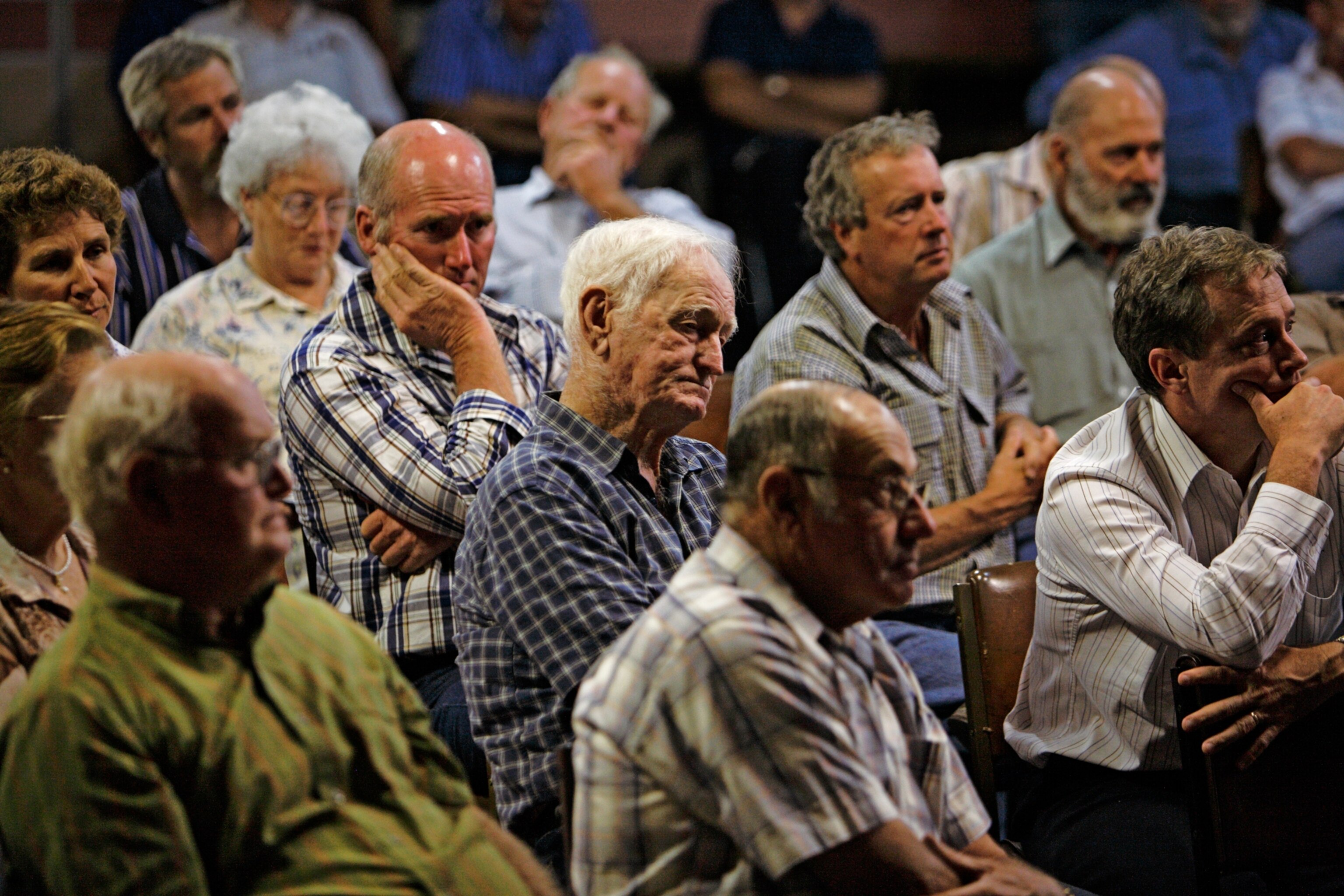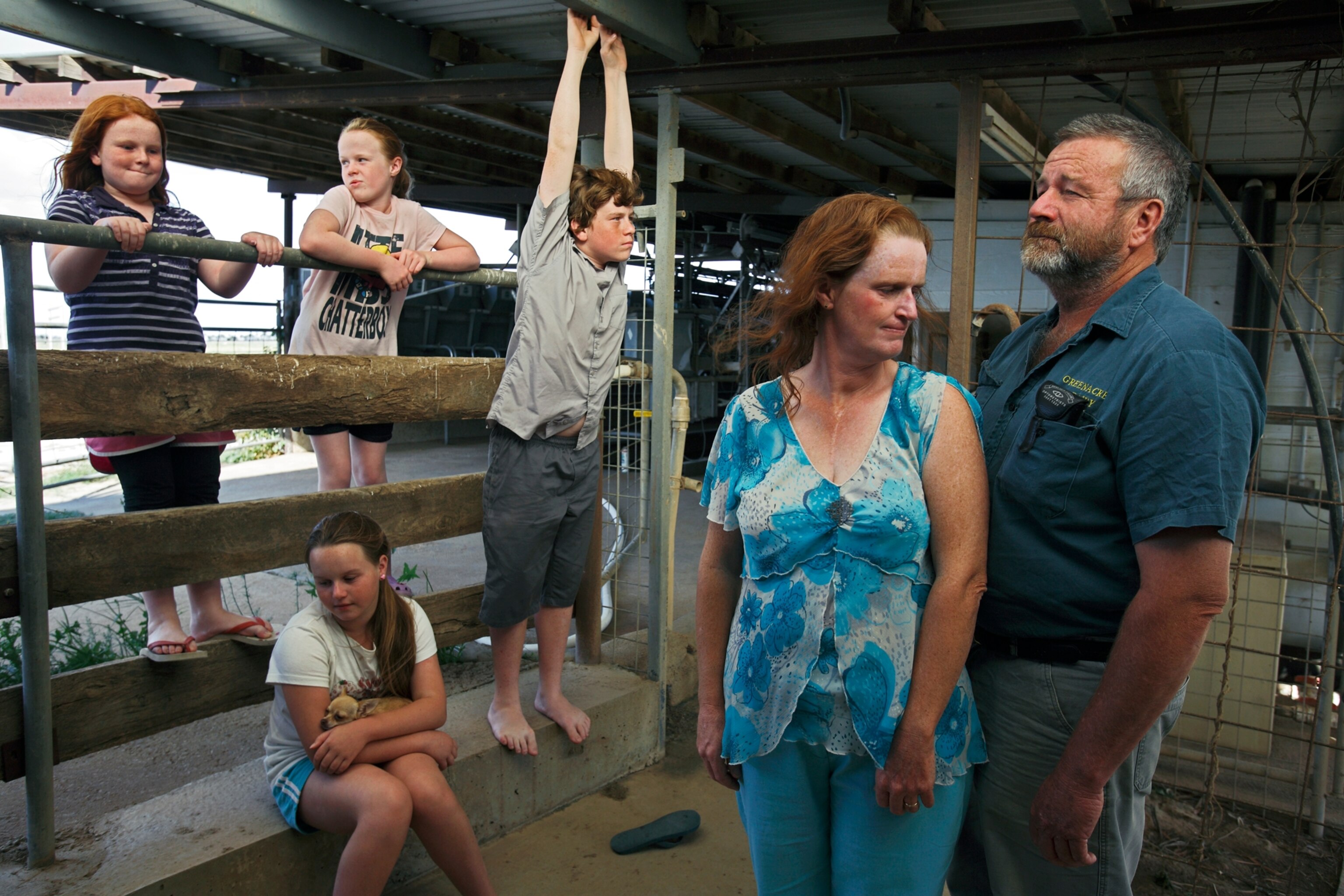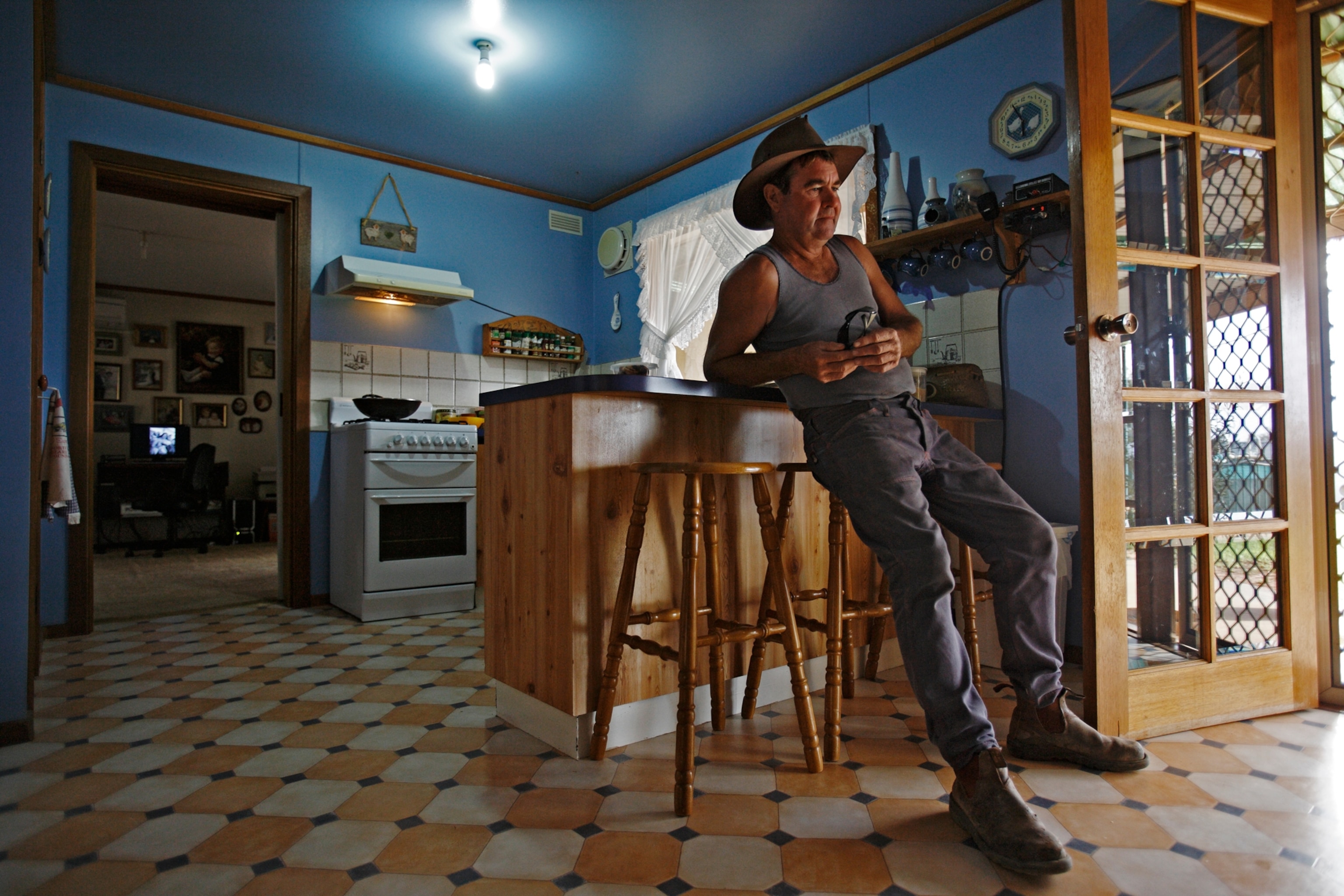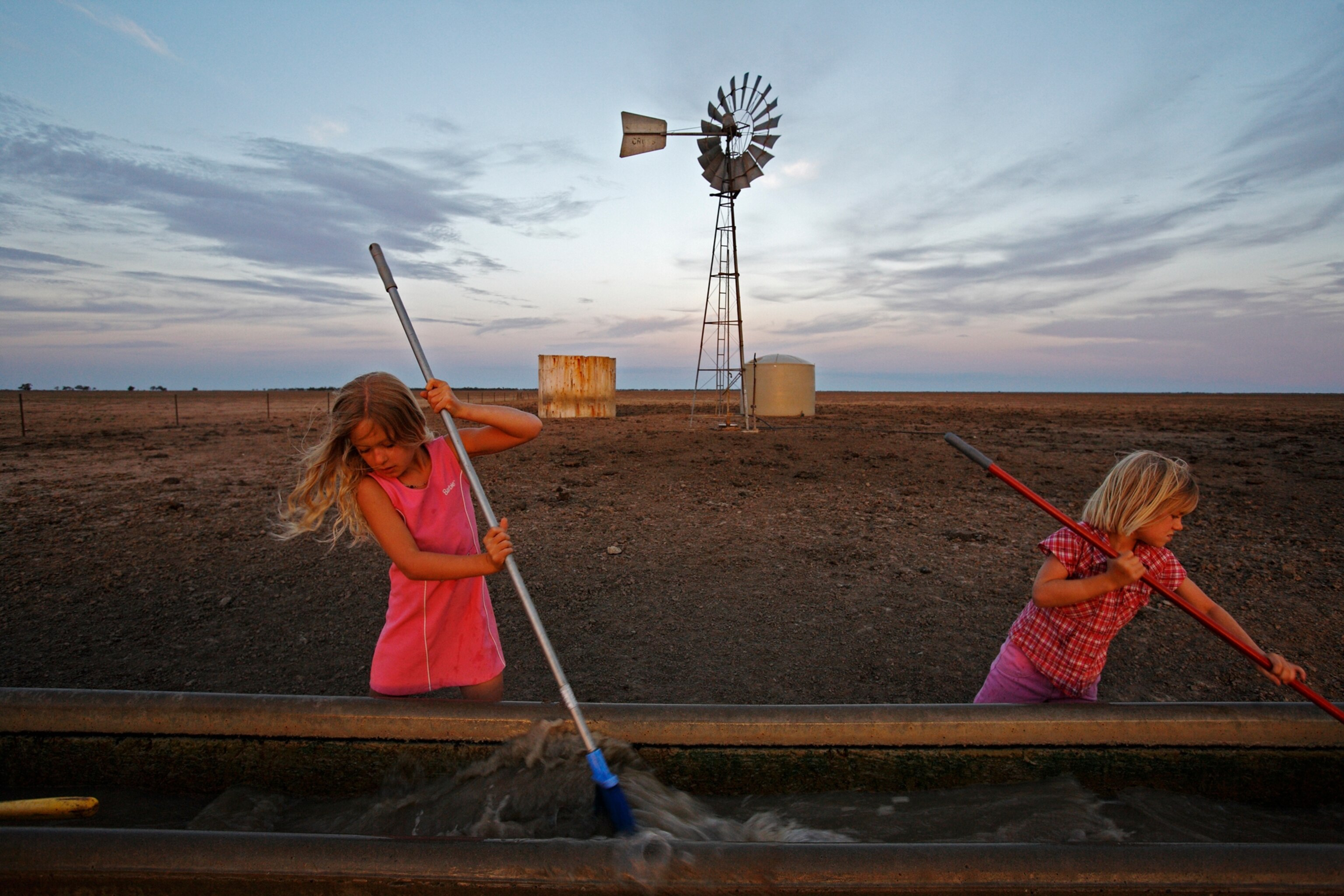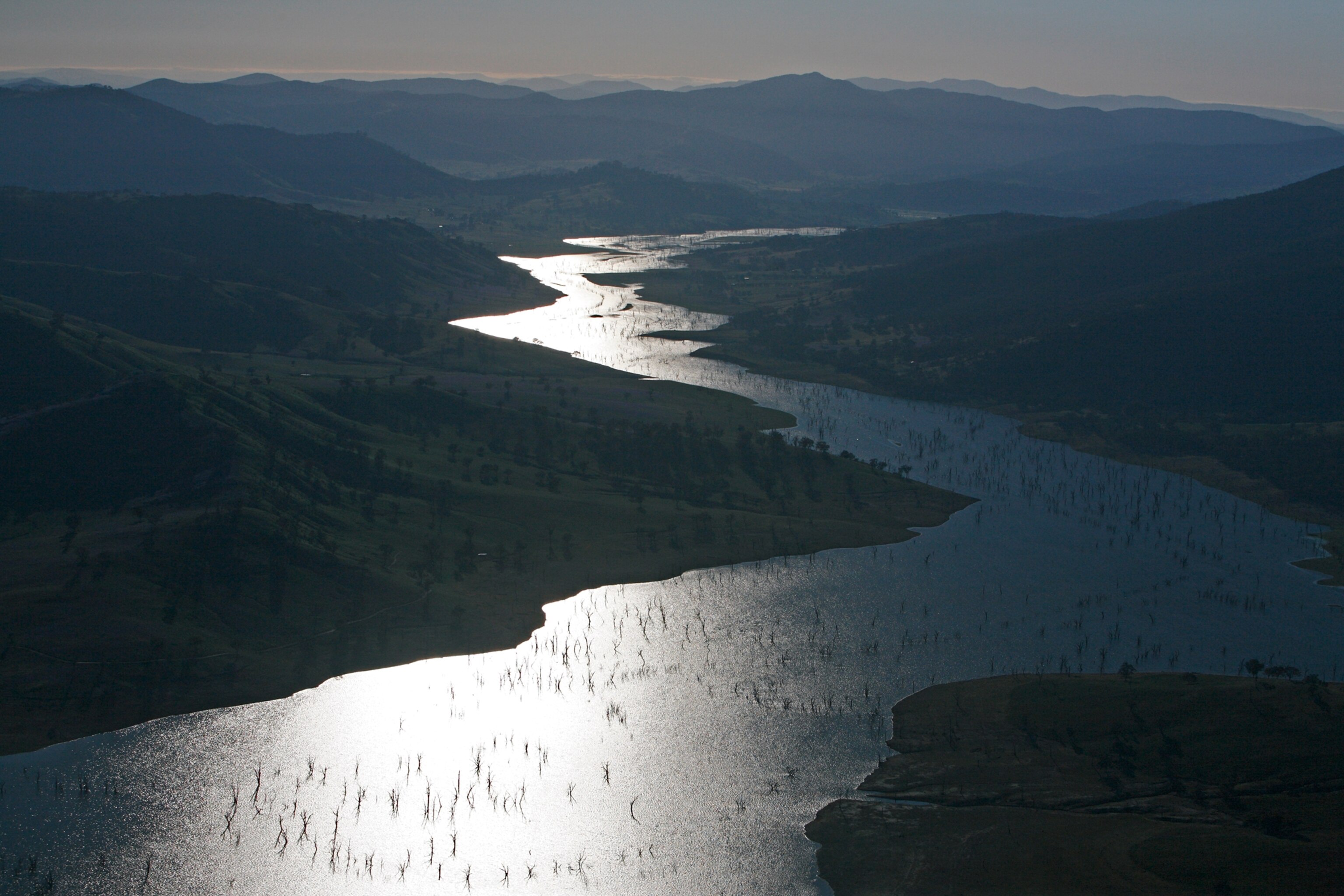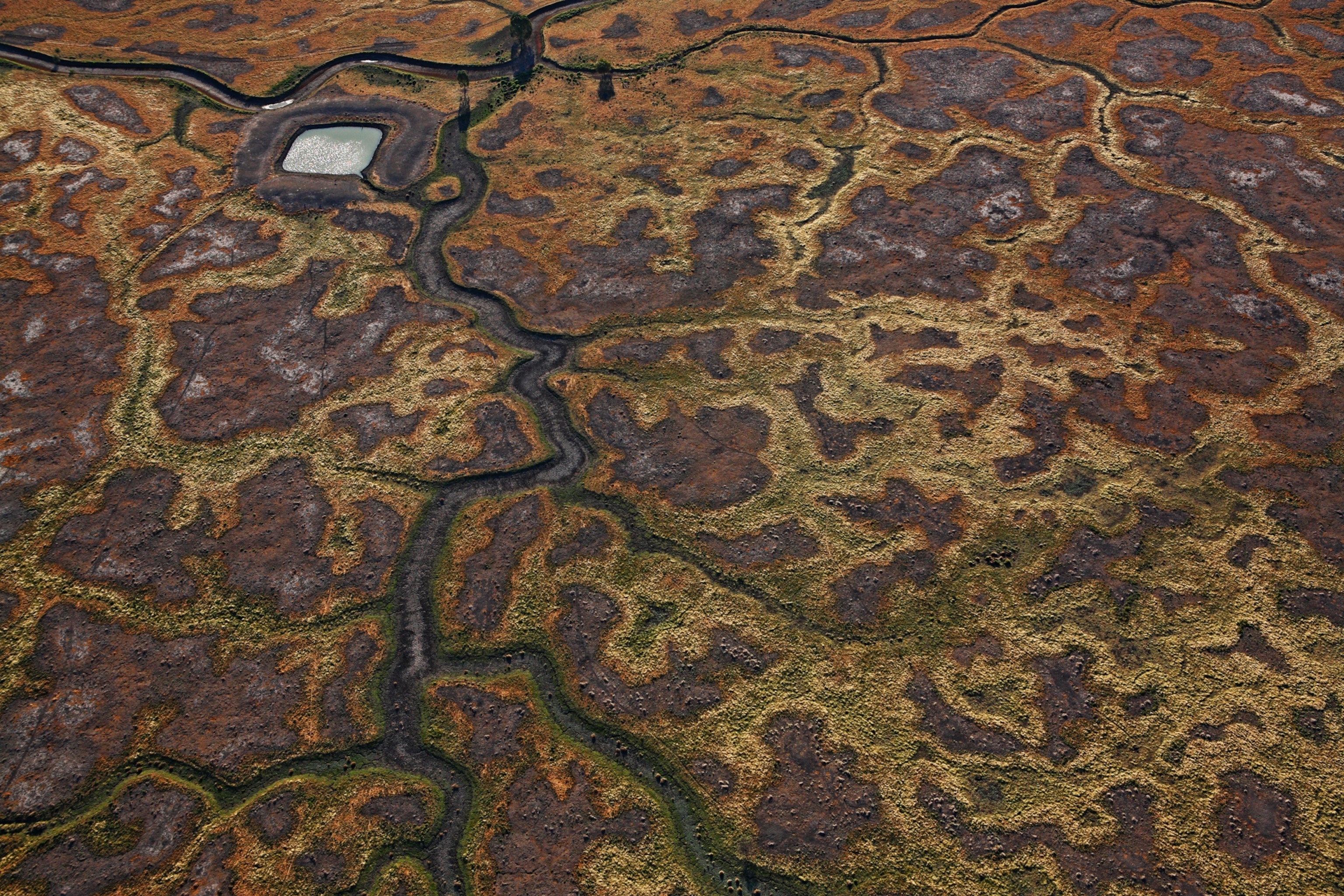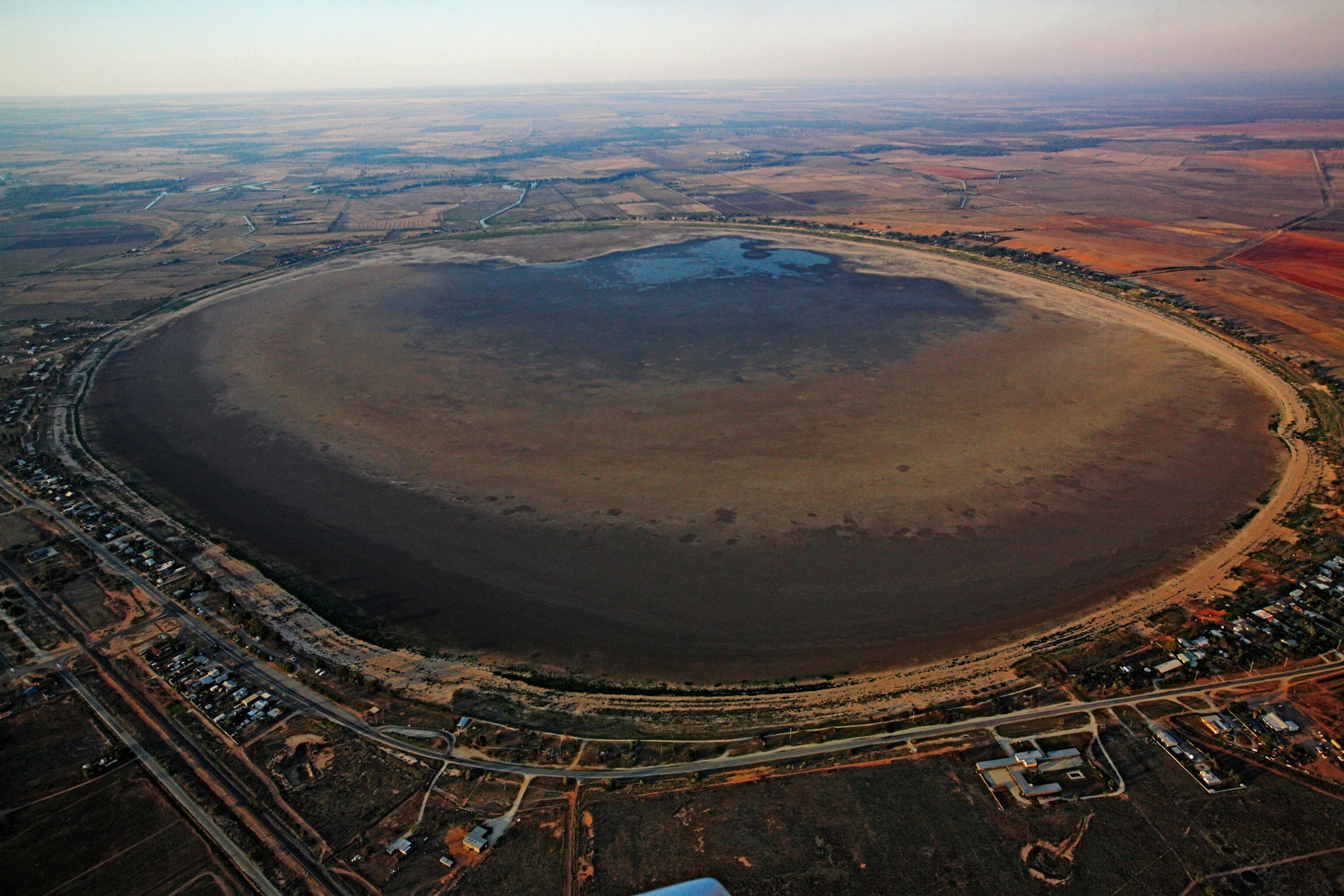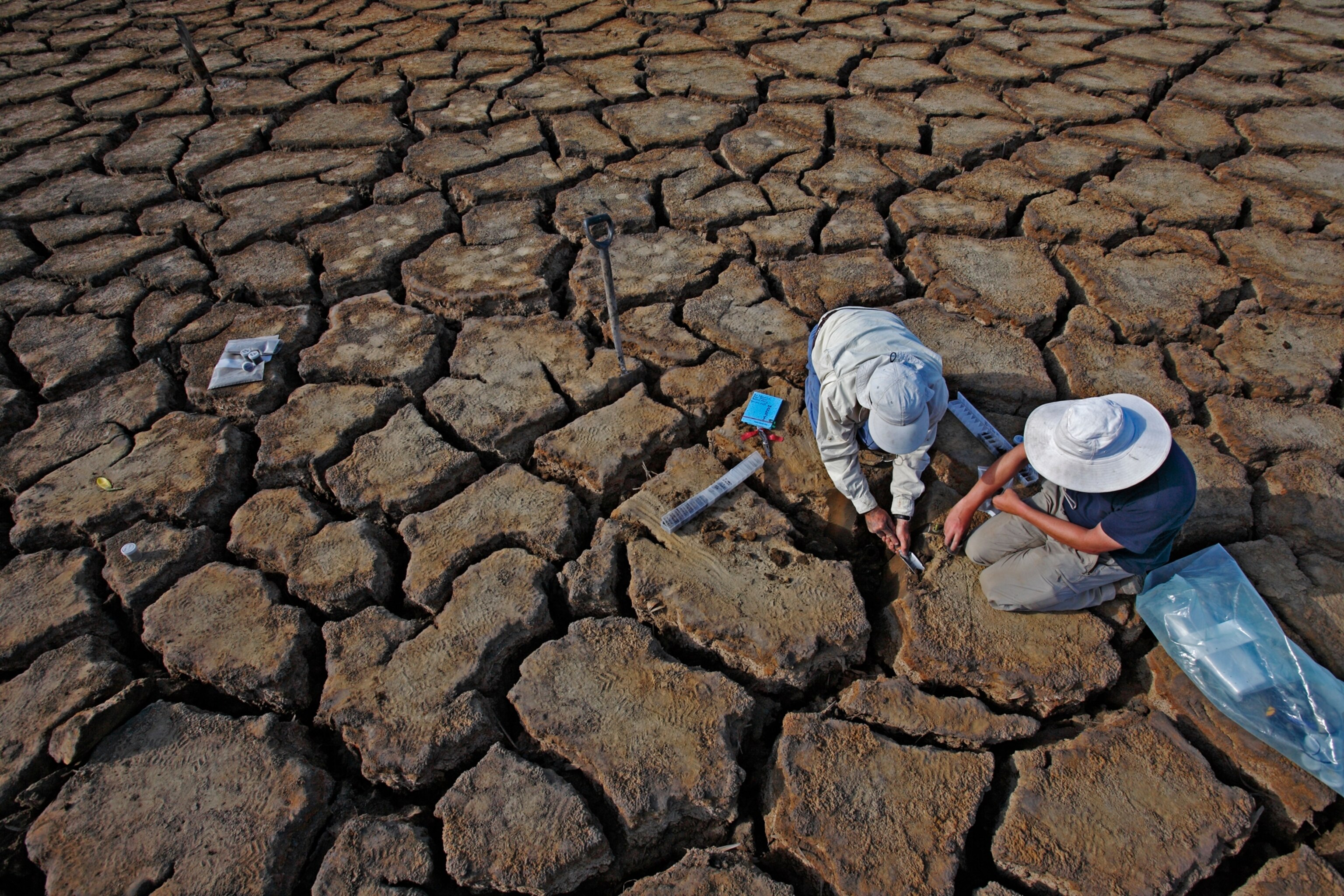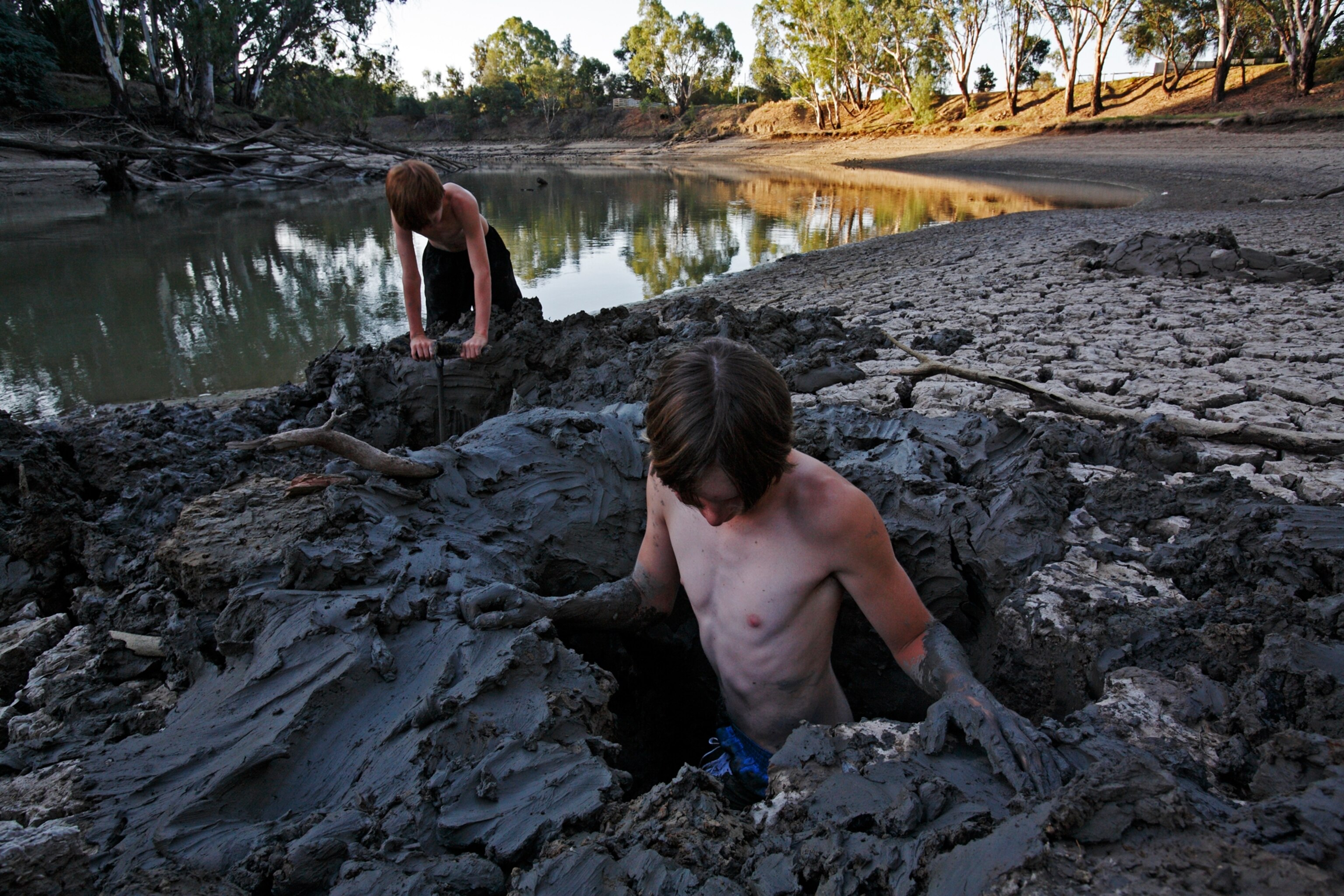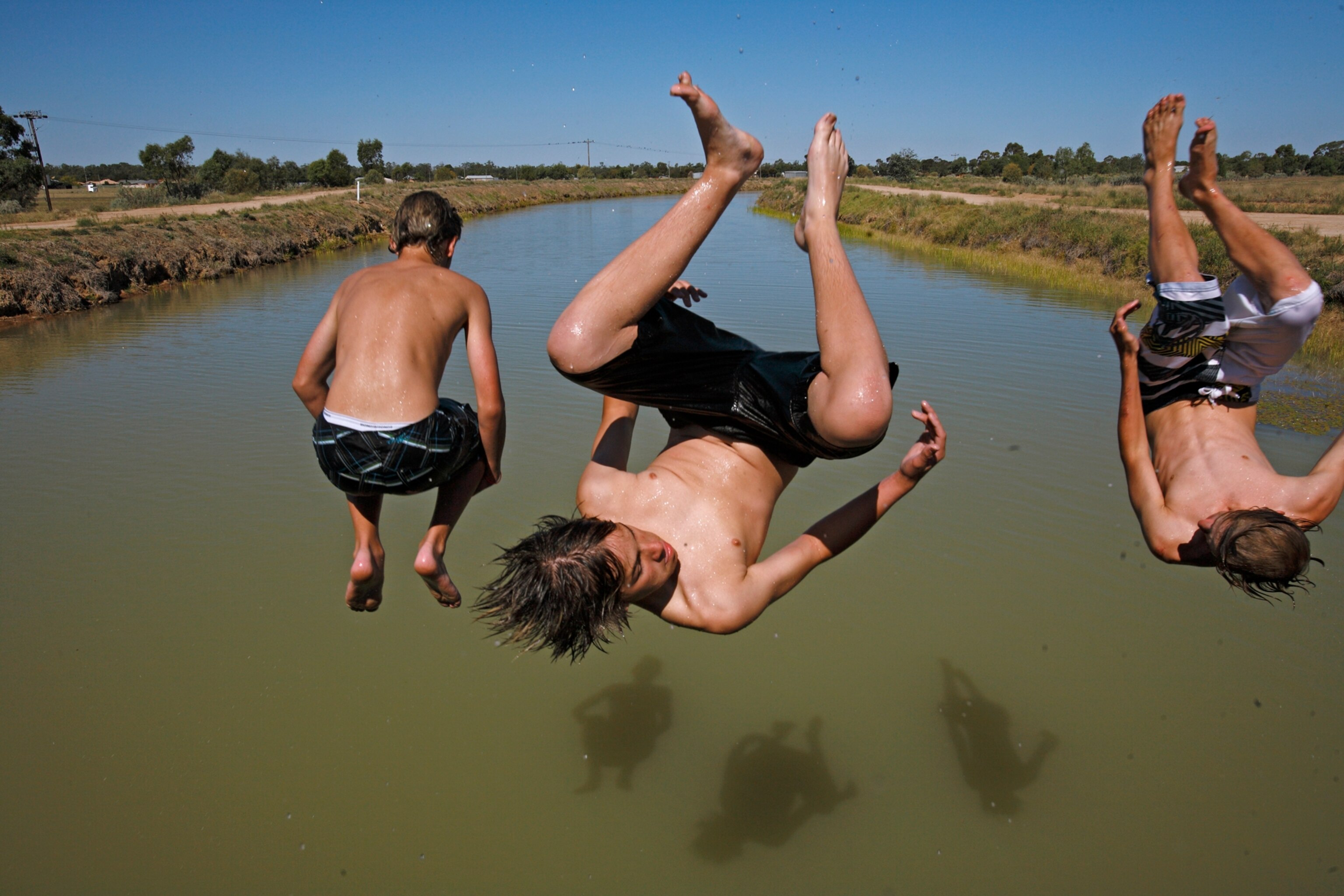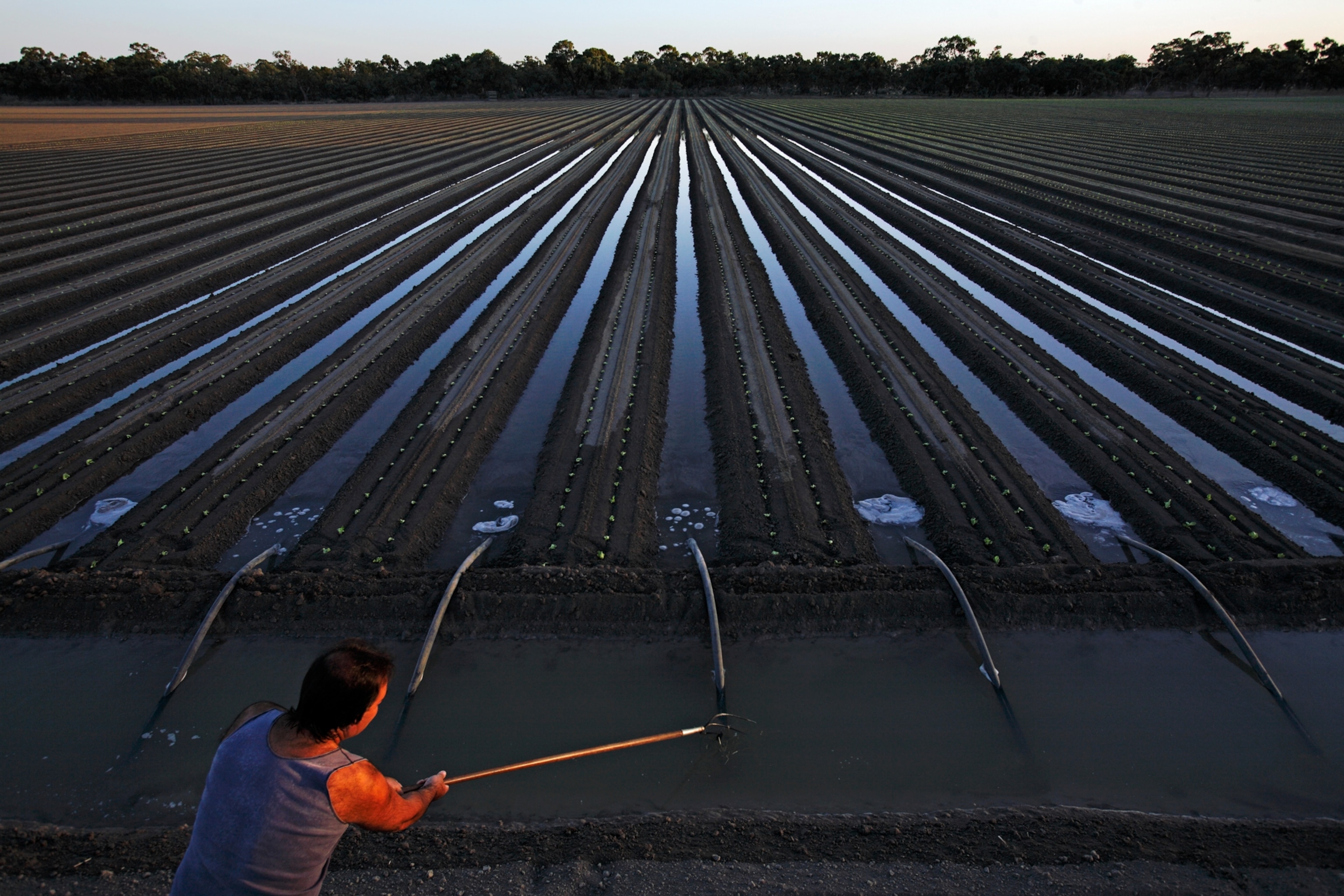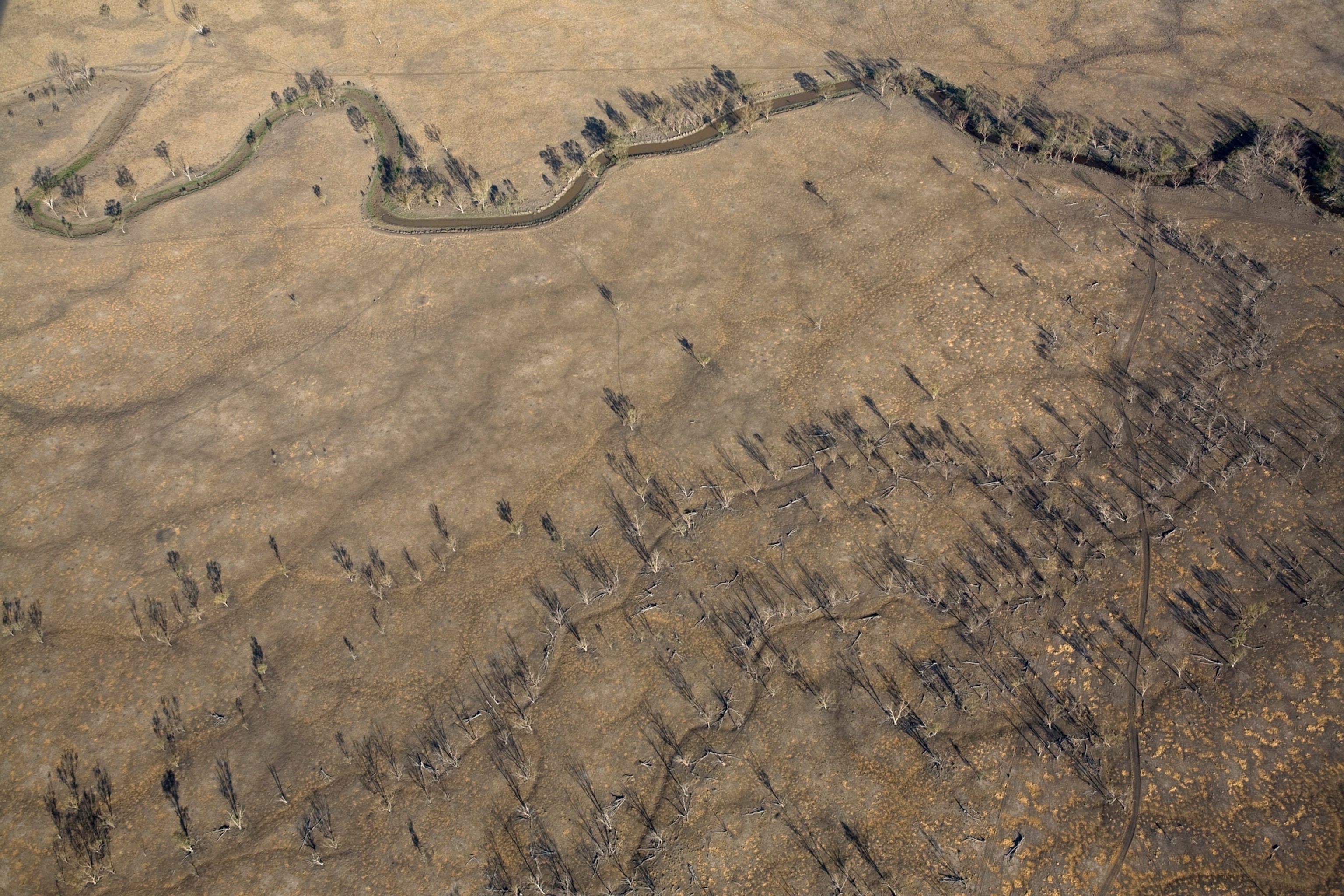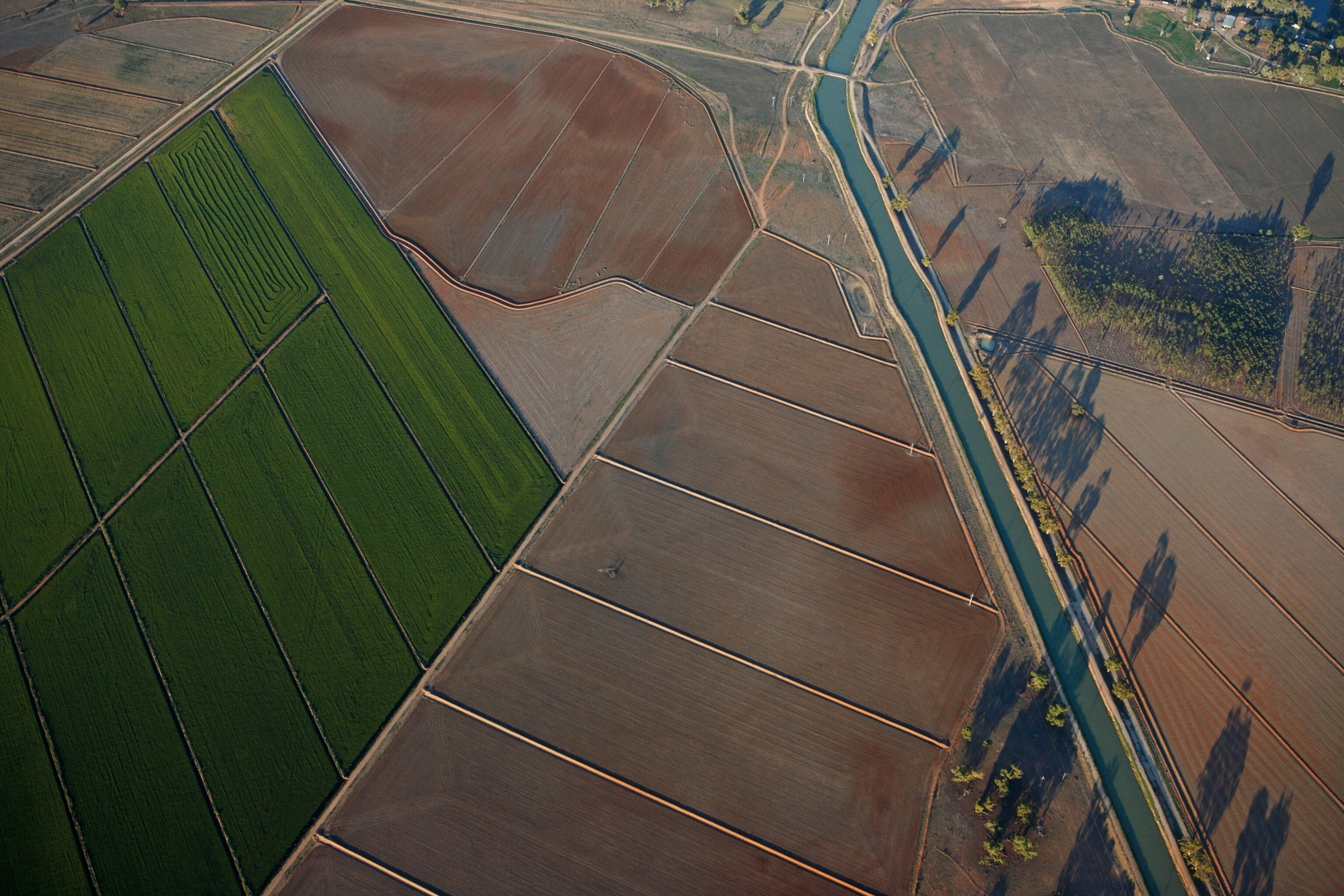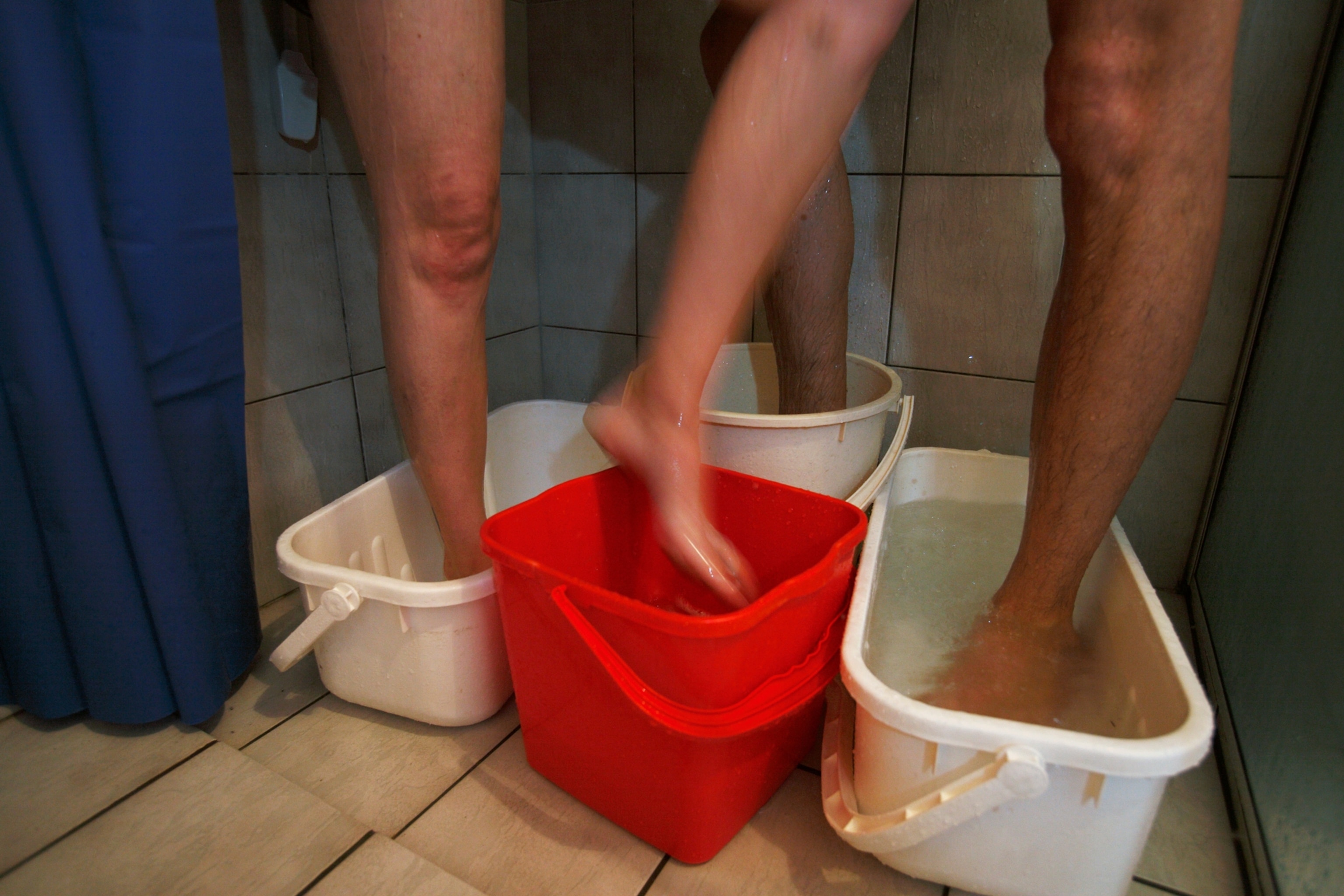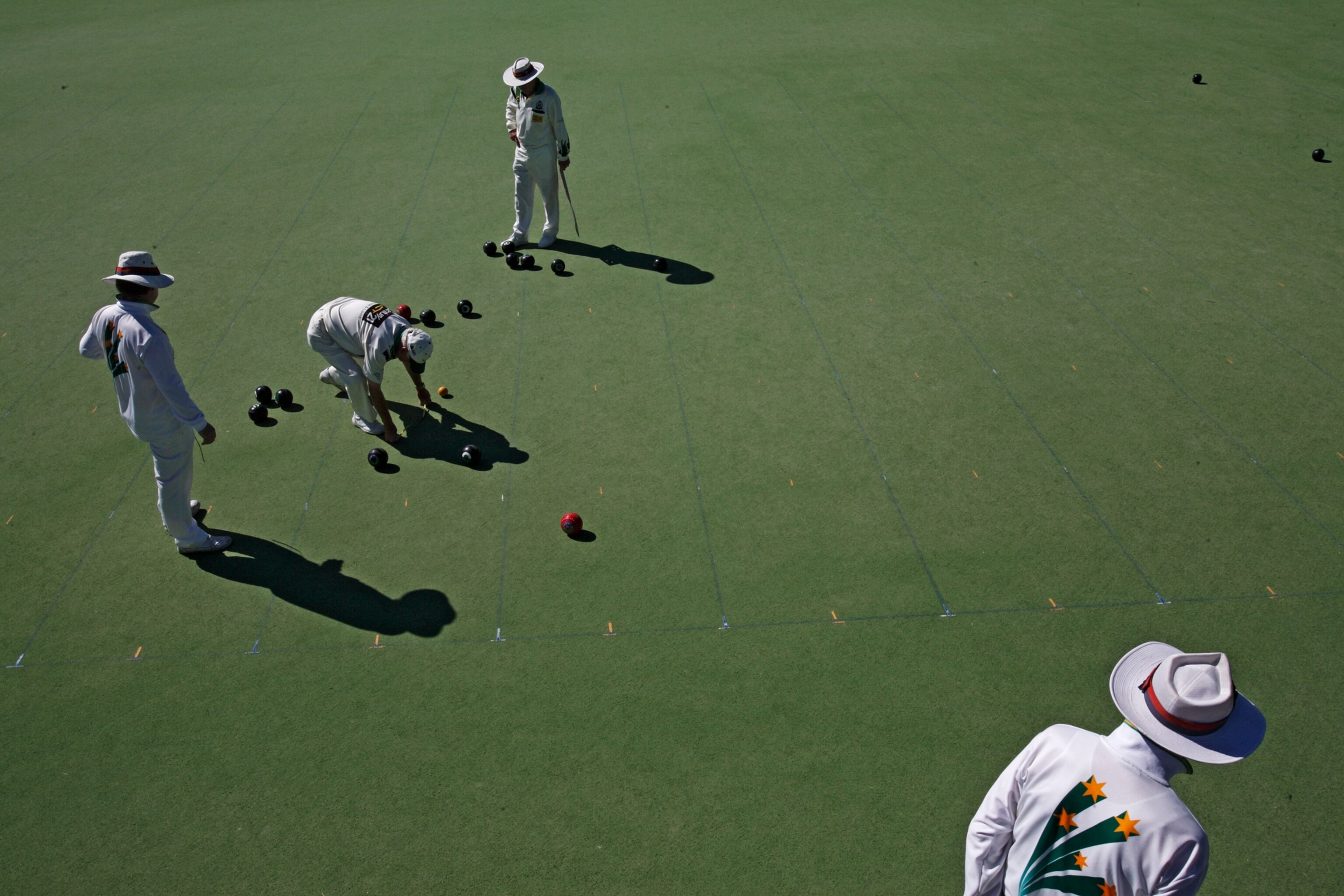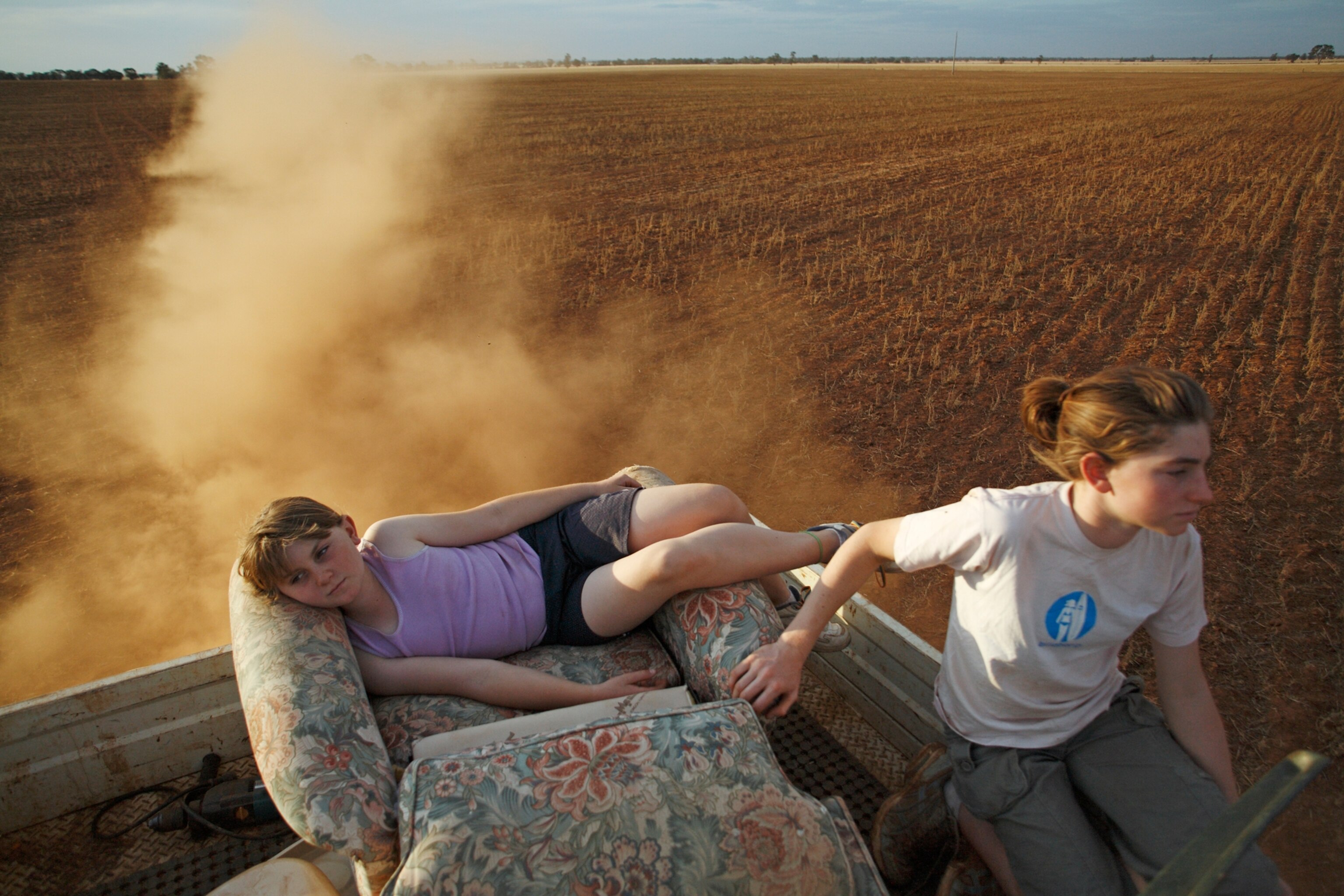Australia’s Dry Run
What will happen when the climate starts to change and the rivers dry up and a whole way of life comes to an end? The people of the Murray-Darling Basin are finding out right now.
On the side of a road somewhere in southeastern Australia sits a man in a motionless pickup truck, considering the many ways in which his world has dried up. The two most obvious ways are in plain view. Just beyond his truck, his dairy cattle graze on the roadside grass. The heifers are all healthy, thank God. But there are only 70 of them. Five years ago, he had nearly 500. The heifers are feeding along a public road—"not strictly legal," the man concedes, but what choice does he have? There is no more grass on the farm he owns. His land is now a desert scrubland where the slightest breeze lifts a hazy wall of dust. He can no longer afford to buy grain, which is evident from the other visible reminder of his plight: the bank balance displayed on the laptop perched on the dashboard of his truck. The man, who has never been rich but also never poor, has piled up hundreds of thousands of dollars in debt. The cows he gazes at through his windshield—that is all the income he has left.
His name is Malcolm Adlington, and for the past 36 of his 52 years he has been a dairy farmer, up at five every morning for the first milking of the day. Not so long ago Adlington used to look forward to a ritual called a dairy farm walk. State agriculture officials would round up local dairy farmers to visit a model farm—often Adlington's, a small but prosperous operation outside of Barham in New South Wales. The farmers would study Adlington's ample grain-fed heifers. They would inquire about his lush hay paddocks—which seeds and fertilizers he favored—and Adlington was only too happy to share information, knowing they would reciprocate when it came their turn. That was the spirit of farming, and of Australia. A man could freely experiment, freely reveal his farming strategies, with the quiet confidence that his toil and ingenuity would win out.
"That," Adlington observes today, "was before the drought came along." A decade ago, Adlington employed five farmhands. "It's just the wife and I now," he says. "The last three years we've had essentially no water. That's what is killing us."
Except there is water. You can see it rippling underneath the main road just a mile from where his truck is parked. It's the Southern Main Canal, an irrigation channel from Australia's legendary Murray River, which along with the Darling River and other waterways is the water source for the South Australia capital of Adelaide and provides 65 percent of all the water used for the country's agriculture. Adlington possesses a license to draw 273 million gallons of water annually from the Murray-Darling River system. The problem is the water has been promised to too many players: the city of Adelaide, the massive corporate farms, the protected wetlands. And so, for the past three years, the New South Wales government has forbidden Adlington from taking little more than a drop. He still has to pay for his allocation of water. He just can't use it. Not until the drought ends. Adlington finds himself chafing at the unfairness of it all. "It's the lack of rain," he says, "but also the silly man-made rules." Those rules seem to favor everyone except farmers like him. Meanwhile, he's selling off his treasured livestock.
"It's easy to get depressed," he says in a calm, flat voice. "You ask yourself, Why have I done it?" Malcolm Adlington didn't use to doubt himself, but then he has not been himself lately. The drought has depleted more than just his soil. He finds himself bickering with his wife, Marianne, hollering at the kids. He can't afford the gas to take Marianne into town as he used to. With all of the other farmhouses closing up, the nearest boy for his son to play with now lives ten miles away.
Adlington has put his own family acreage up for sale. "Haven't had one person look at it," he says. Not his first choice, obviously. Not what an Adlington would ever wish to do. But when the hell did his dad or granddad ever have to deal with a bloody seven-year drought?
It has been three parched years since any dairy farm walk that Adlington can remember. Instead, there are morale-boosting events with upbeat monikers like Tackling Tough Times or Blokes' Day Out—or Pamper Day, which Adlington's wife happens to be attending today. At Pamper Day, a few dozen farming women receive free massages and pedicures and hairstyling advice. A drought-relief worker serves the women tea and urges them to discuss what's on their minds. They all share different chapters of the same story.
"It's been two years without a crop."
"The family farm is on its knees."
"We sold most of our sheep stock—beautiful animals we'd had for 20 years."
"I can't stand lying in bed every night and hearing the cattle bellow from hunger."
Still, the most poignant gatherings are out of public view. One takes place in a modest farmhouse near Swan Hill. A government rural financial counselor sits at the kitchen table, advising a middle-aged stone-fruit farmer and his wife to declare bankruptcy, since their debt exceeds the value of their farm and a hailstorm has just ravaged their crop.
Holding his wife's hand, tears leaking out of his eyes, the farmer manages to get out the words: "I have absolutely nothing to go on for."
The woman says she checks every couple of hours to make sure her husband is not lying in his orchard with a self-inflicted gunshot wound in his head. When the meeting is over, the counselor adds their names to a suicide watch list.
Back in Barham, Malcolm Adlington sits alone in his truck going nowhere—watching his herd dwindle, his meadows receding into desert scrubland. All he can do is watch.
The world's most arid inhabited continent is perilously low on water. Beyond that simple fact, nothing about Australia's water crisis is straightforward. Though Australians have routinely weathered dry spells, the current seven-year drought is the most devastating in the country's 117 years of recorded history. The rain, when it does fall, seems to have a spiteful mind of its own—snubbing the farmlands during winter crop-sowing season, flooding the towns of Queensland, and then spilling out to sea. To many, the erratic precipitation patterns bear the ominous imprint of a human-induced climate shift. Global warming is widely believed to have increased the frequency and severity of natural disasters like this drought. What seems indisputable is that, as Australian environmental scientist Tim Kelly puts it, "we've got a three-quarters of a degree [Celsius] increase in temperature over the past 15 years, and that's driving a lot more evaporation from our water. That's climate change."
It has taken a while for Australia to wake up to that reality. After all, the country was transformed by rough-country optimists unfazed by living on one of the least fertile landscapes on Earth. Australian scientist Tim Flannery calls it a "low-nutrient ecosystem," one whose soil has become old and infertile because it hasn't been stirred up by glaciers within the past million years. The Europeans who descended on the slopes of the Murray-Darling Basin—a vast semiarid plain about the size of Spain and France combined—were lulled by a string of mid-19th-century wet years into thinking they had discovered a latter-day Garden of Eden. Following the habits of their homelands, the settlers felled some 15 billion trees. Unaware of what it would mean to disrupt an established water cycle by uprooting vegetation well adapted to arid conditions, the new Australians introduced sheep, cattle, and water-hungry crops altogether foreign to a desert ecosystem. The endless plowing to encourage Australia's new bounty further degraded its soil.
And so a river became the region's lifeline. Like America's Mississippi River, the 1,600-mile Murray carries mythological significance, symbolizing endless possibility. Its network of billabongs, river red gums, Murray cod, and black swans are as affixed to the Australian ethos as the outback. From its headwaters in the Australian Alps to its destination at the Indian Ocean, the slender river meanders along a northwestern course, fed by the currents of the Murrumbidgee and Darling Rivers as it cuts a long borderline between New South Wales and Victoria before entering the semiarid brush country of South Australia and plunging toward the ocean at Encounter Bay. That its journey appears unhurried, even whimsical, adds to the river's legend.
Progress, for Australians, has involved bending the Murray River to their will. Over the past century, it has been mechanized by an armada of weirs, locks, and barrages, so that the flows will be of maximum benefit to the farmers who depend on irrigation in the Murray-Darling Basin. As a result, says former commonwealth water minister Malcolm Turnbull, "we've got an unnatural environment in the river. Because it's regulated, the river now runs high when nature would run it low, and low when nature would run it high." That manipulation had unintended consequences. Irrigation caused salinity levels to skyrocket, which in turn poisoned wetlands and rendered large stretches of acreage unfit for cultivation.
Such was the rickety state of Australia's water supply even before the drought fell on it like a mallet, delivering a psychic blow for which the plucky land down under was not prepared. The crisis has pitted one state against another, big cities against rural areas, environmental managers against irrigators, and small farms against government-backed superfarms in a high-stakes competition for a shrinking commodity. Well beyond the national breadbasket of the Murray-Darling Basin, every major urban area has faced the clampdown of water restrictions and the subsequent browning of its revered English gardens and cricket ovals. The trauma is particularly acute in rural bastions of self-reliance, like the New South Wales dairy community inhabited by Malcolm Adlington, which are fast becoming ghost towns. Whole crops have been wiped out by heat stress and low moisture, while entire growing sectors—rice, cotton, citrus—face collapse.
The once quintessential Australian swagger has now come to resemble, in the wake of the water crisis, what Swiss psychiatrist Elisabeth Kübler-Ross famously termed the "stages of grief": denial, anger, bargaining, depression, acceptance. In what is shaping up to be a cautionary tale for other developed nations, the world's 15th biggest economy is learning hard lessons about the limits of natural resources in an era of climate change. The upside is that Australians may be the ones to teach those lessons to the rest of the industrialized world.
In the Riverland district of South Australia, a 48-year-old man drives through his citrus orchard on a bulldozer, mowing down 800 of his Valencia and navel orange trees. The man knows what he is doing. Something must give. For decades the mighty Murray River transformed this land into a lush patchwork of olive, citrus, apricot, and avocado orchards. But now the water bureaucrats have announced that South Australians may use only 16 percent of their annual allocation. And so Mick Punturiero, a third-generation farmer of Italian descent, has made a hard choice: He elects to sacrifice his orange trees and reserve what water he has for his prized lime orchard. Underneath the roaring of the engine, Punturiero hears the cracking of muscular trunks he has nurtured for 20 years. And what roils inside him is something darker than sorrow.
A few weeks later two state officials come to Punturiero's village of Cooltong, just outside Renmark, a few hours' drive from Adelaide. They have an announcement to make. The catchment levels at Hume Dam have been revised, and it's good news: The water allocation has been doubled, to 32 percent! The farmers in attendance are not overjoyed. Truthfully, with the drought bearing down on them, 32 percent of what they need is not enough to save their orchards. All Punturiero can think is, I could have kept my orange trees.
Two months later, Punturiero is still possessed of operatic rage as he pours a guest some homemade lime juice and drops his meaty frame into a chair. Why has it taken them so long to recognize this water crisis? he demands. "Let's go to THEIR house! Tell them which child THEY have to sacrifice to save their whole family! Let's put THEIR family in a pile!"
He takes a deep breath. "I get very upset talking about this issue," he says. "I get very, very, VERY agitated over it. End of the day, what's been done is criminal." As to the actual crime and its perpetrators, Mick Punturiero flails with theories. Mostly he blames government officials who encouraged agricultural development beyond sustainable levels. Even in his more reflective moments, he does not entertain the notion that the problem arises from the folly of growing citrus on the wrong side of "the line."
The line is Goyder's Line, a boundary that marks the limit of sufficient rainfall for crops to grow in South Australia. In 1865 a surveyor named George Goyder set out on a remarkable journey by horseback to trace the point where grassland gave way to sparse bush country. Australia's settlers relied on Goyder's Line to demarcate arable land from land unsuitable for agriculture. Except when they didn't: Renmark, for instance, lay on the wrong side of Goyder's Line, but that did not stop two Canadian brothers named Chaffey from developing an irrigation system in Renmark two decades after the surveyor's warning.
As it turns out, the Chaffeys were three decades ahead of their time. The Australian government inaugurated its first "soldier settlement" scheme after World War I, offering land, water, and farm machinery to veterans. In the decades that followed, orchards and vineyards and wheat fields miraculously sprang up from former scrub desert north of Goyder's Line. Canal after canal was dug to deliver the Murray's water to the new farmland—and later, to sprawling irrigation districts dedicated to the nascent (and highly water-thirsty) rice industry. By the early 1970s, Australia was a major exporter of such crops, its farming lobby had emerged as a formidable political force, and the government was selling off water licenses to any bloke who fancied being his own boss and who wouldn't whinge when the odd drought came along.
Mick Punturiero's grandfather was a Calabrian émigré who bought his first acreage from a retiring World War II veteran, one of thousands more soldiers enticed by the government to develop the basin. The audacity of farming in such an arid area was not readily apparent to Punturiero's grandfather, who had no education other than in how to grow an exquisite grape.
Soon the Murray began to run low, and fields started to salt up. Unfortunately, the prescriptions only helped spread the disease. Leakproof irrigation technology meant that less water returned to the system. Salt interceptors kept crops from being poisoned, but only by pumping out limitless quantities of water. In 1995 the Murray-Darling Basin Commission finally introduced a cap on how much water each state could draw from the river. But the binge didn't end. Farmers who owned water rights but had never used them proceeded to sell their now coveted "sleeper licenses" to others who would. Industrialists were offered tax incentives to create superfarms and introduced vast olive and almond groves to the basin.
Meanwhile, the governments of New South Wales and Queensland routinely flouted the extraction cap and continued to hand out licenses. "The increase in diversions from the Murray River in the late nineties was rather like drinkers in a bar," says Malcolm Turnbull. "The barkeeper says, 'Last orders, gentlemen.' And everyone rushes in to drink as much as they can before they get thrown out. That's what we were doing. Just as it became apparent that resources were overtaxed, there were more claims on it."
A decade ago, Mick Punturiero had grown to be South Australia's biggest lime producer and was doing all the right things. He employed the latest water conservation technology. What water he did not need he donated back to the state for environmental usage. Even so, he could see where the increasing demands on the Murray would lead. He recalls warning a state official in the late 1990s, "You need to stop this development. We're poorly managing our water resources."
He remembers the official's words as if uttered yesterday: "Mick, you can't control progress."
Then came the drought, which began like any other, in 2002. But it has not ended, and now the binge is over. Though dryland farmers who depend on rain have watched their corn and wheat fields dwindle into dust plains, they at least have been accustomed to braving parched seasons. By contrast, "irrigated farmers have always had water, and never in their wildest dreams did they think somebody would turn the tap off," says rural financial counselor Don Seward. But as the drought advanced, the allocations have plummeted: 95 percent. Then 50. Then 32. And now, in Mick Punturiero's case, back to 16 percent.
"The river's no different from the highways every Australian pays for through his taxes," he argues. "Every Australian has paid for the locks. We've paid for the Dartmouth Dam, which was supposed to drought-proof South Australia. So why don't you give me my full allocation? Give it to me! It's rightfully mine!"
Punturiero sees himself as the faithful caretaker of land that the Australian government gave to reward the service of young men who died on the sands of Gallipoli. He sees that land as a gold ingot that the government has turned into a lump of lead. He sees powerful interests profiting at his expense. He sees new irrigators downriver sucking the system dry. He also sees fellow farmers much like his grandfather, who never bothered to put a dime into savings, tumbling into insolvency. Or committing suicide. And he understands their bottomless despair. He feels it himself at times—"boxed into a corner," he says in a suddenly depleted voice, "and I can't defend my family no more."
But fury returns. Anger is all Mick Punturiero has at the moment. He will not go down without a fight—that he pledges: "You won't see me crawling off the farm on me hands and knees—not unless I see some bloody heads roll first!"
It is hard for many Australians to reconcile the sputtering, surgically disfigured version of the Murray River with the shimmering idyll of their younger days. At the river's mouth, a flourishing ecosystem had long been nourished by the natural ebb and flow of seawater and fresh water. The ocean would rush in when the river ran low and then be pushed out by fresh water as the first hard rains drained down the Murray to the sea. Today the overallocation of irrigation water, coupled with the drought, has brought the river to a virtual standstill. So that the beleaguered Murray can meet the sea, its mouth must be dredged around the clock. Without dredging, the mouth would silt up, cutting off fresh water to the lagoon ecosystem called The Coorong and to nearby Lake Alexandrina.
It is here, every morning, that a 65-year-old silver-haired fisherman in waders and a Windbreaker navigates his aluminum boat out into the waters of Lake Alexandrina, or what is left of it. Long humps of silt-covered land rise up out of the water. Since most everyone else in his line of work has moved away, Henry Jones has the lake to himself—not counting the pelicans, though he, in fact, does count them, thinking: Maybe a tenth of what there was. And no white ibis. No blue-billed duck. Edging up to the northern Coorong lagoon, Jones reaches into the water to collect his gill nets. Among his catch there is not a single silver perch or Murray cod or bony bream. The salty water has done them in. Only carp survive. Dozens of carp, which did not even exist in the lower lakes a quarter century ago, and whose presence signals the demise of the freshwater environment.
Jones has adapted to the changes in a way the vanishing species cannot. He has found retailers who will buy all the carp he can catch. And truthfully, he could adapt further. If, as is expected, the government constructs a weir near the bottom of the river to give urban dwellers in Adelaide more water, Lake Alexandrina and its sibling Lake Albert would become saltwater lakes. "Personally, I'd probably be better off catching mullet, flounder, black bream, and a couple of other marine species," he says as he sits at the dining room table of the house he built 40 years ago. "But it's just not right. These lakes have always been freshwater. It's just a massive change. It's nonsense."
The drought has left his community reeling. Local winemakers have recently been informed that the Murray River would no longer be available for their vineyards. And Jones is a close friend to the elders of the Ngarrindjeri Aboriginal people, whose 30,000-year domain over the river abruptly ended when the expedition led by Capt. Charles Sturt arrived at the Murray's mouth in 1830. For the Ngarrindjeri, the drought has led to the disappearance of black swan eggs, freshwater mussels, and other sacred totems that are vital to their spiritual and physical nourishment.
Still, in the scramble to claim a share of Australia's diminishing water supply, these people at least have a voice. The creatures of the lakes and wetlands do not. "In a crisis, the entitlement the environment supposedly has is totally subjective to political whims," says Murray River environmental manager Judy Goode, who refers to herself as "the manager of dead and dying things." Even protected ecosystems—such as The Coorong and, in the northern basin, the Macquarie Marshes of bird-nesting legend—receive no special dispensation, so long as there is a "critical human need" to be met.
So Henry Jones has become the de facto voice for the dead and dying, delivering a well-honed, if mournful, monologue to whoever will listen: All the systems are on the point of collapse. Two-thirds of The Coorong is already dead—its salinity is almost that of the Dead Sea. What Jones finds, as he travels around the basin to argue that water must be allocated for his Coorong and his lakes, is a sentiment that the whole water crisis is the environmentalists' fault anyway. The greenies are derided for their shrill sanctimony. Farmers express indignation that any of their precious "working river" is lost to the sea. They tell Jones that it makes more sense to divert the Murray all the way inland, officially consigning the river to eternal servitude as an irrigation channel, while fishermen buck up and learn to live off the sea. In cotton-growing areas wholly dependent on irrigation, Jones says, "I'm lucky to get out with my life."
The Coorong represents only one glaring example of the Murray-Darling Basin's imperiled ecosystem. For example, Australian scientists and government officials were caught unaware when farther upriver some invisible drought-tolerance threshold was crossed and hundreds of thousands of river red gum trees—in the world's biggest such forest—suddenly died. And of late, a fresh concern has emerged: that the wetlands may be brewing toxins. Robbed of their seasonal flushing, and instead unnaturally submerged for decades, the swamps have become so dry that the crusted silt has reacted with air to form large surfaces of sulfuric acid. Scientists haven't fully gauged the threat to animals and people. For now, as University of Adelaide water economist Mike Young observes, "you wouldn't want to put your hand in it."
Adelaide may have the dubious distinction of being the world's first industrialized city to live in a constant state of water shortage. Its unhealthy reliance on the Murray—up to 90 percent of its water supply in low-rainfall periods—is symbolized by two unsightly pipelines that stretch more than 30 miles from the river to the city's water tanks. Since shortly after the drought's onset in 2002, the South Australia capital has been on water restrictions. Its residents dutifully cart buckets of used shower and washing machine water outside to their gardens. Native plants and artificial lawns are de rigueur. The racks of hardware stores are crammed with soil wetters, gray water diverter hoses, water-restricting shower nozzles, four-minute shower timers, and other tributes to water austerity. The radio "talk-back" shows have become reliable outlets for ranting about this or that water abuser.
Still, civic virtue is no substitute for lasting reform. The nation's water crisis won't be solved by "drought-proofing" Adelaide, which, despite its dependence on the Murray, claims only 6 percent of the total drain on the river. "South Australia's very aware that they're living precariously," says Wilderness Society environmental activist Peter Owen. "We're not going to save our river system by standing in buckets."
Meanwhile, outside of the Murray-Darling Basin, the drought has exposed serious flaws in the water resources of Sydney, Melbourne, and Brisbane, among other urban areas. The hard lesson of Australia's dry run is that the country's jaunty boosterism no longer suffices as the way forward. "I work on the assumption that we're going to see more episodes of this type of drought in the future because of climate change," says Malcolm Turnbull, whose Liberal Party leader John Howard, a longtime climate change skeptic, was turned out of office in November 2007. "A prudent minister assumes it's going to get hotter and drier, and plans accordingly."
But what does this mean, really? Will it mean the construction of expensive desalination plants in Adelaide, Sydney, and elsewhere, with escalating energy bills? Will it be possible to develop drought-resistant crop varieties to keep food production up? Or to drastically reduce the water needs of dairy farmers who use a thousand gallons of water for each gallon of milk they produce? Will the Murray River's hard labor continue, or will it see mercy? A robust new landscape is required, and it's up to Australia to show the rest of the industrialized world what that new landscape will be. For starters, it may be a landscape that's come to terms with limitations. Goyder's Line is even more relevant today, as drought and climate change give new urgency to the question of how intensively marginal agricultural land should be worked—or whether it should be left fallow.
After all, the final stage of coping with loss is acceptance. Back in 1962 Frank Whelan was the third farmer in his New South Wales district to receive a water allocation to grow rice, six years before the town of Coleambally was incorporated. Until this season he always had a crop. Although he's 74, his memory is as clear as his eyes. Droughts, market fluctuations, wrangles with the government, and, yes, incessant sniping by environmentalists that rice requires enormous quantities of water and therefore has no rightful place on this semiarid continent—Whelan remembers Coleambally prospering through all the adversity. He remembers town gatherings when the news was almost always good, because the irrigation water was always there.
Today the mood is different as Whelan sits in the local bowling hall with 200 fellow farmers. For four hours they listen as a panel of experts say there will be no irrigation water for Coleambally for the foreseeable future. They are suggesting new economic avenues for the town—things that have nothing to do with rice. A number of farmers voice their outrage. They blame the bureaucrats. They blame the environmentalists. They blame New South Wales. But Whelan says nothing. He just sits there, his pale eyes blinking, occasionally rubbing his wrinkled forehead with a hand that includes two fingers mangled by a farm equipment accident.
He has seen this coming. With the onset of the drought, he compacted his soil with a padfoot roller to minimize leakage. He began to cut off some of his acreage from water. Then still more acreage. All the while, the lifelong farmer watched as national production of rice dropped from more than a million tons a year to 21,000, contributing to the food shortage being felt across the globe. Australia, which has served as a food bowl to the world, is searching for a future. Whatever that future may be, Whelan knows the rice-growing town of Coleambally will never play the same role.
And so after the meeting breaks up, a fellow farmer sidles up to him and asks, "Well, what do ya think, mate?"
The question is one that will continue to preoccupy Coleambally for some time to come. At one point, residents actually tossed in the towel and offered to sell the entire town and its water supply to the commonwealth for $2.4 billion. A few days later, they rescinded the offer, digging in their heels and insisting the town will remain a vital food provider.
The wrangle will continue, in Coleambally and throughout Australia. But some have arrived, however reluctantly, at a point of acceptance. A year after the reporting for this story began, dairy farmer Malcolm Adlington sold off the rest of his cattle and now drives a minibus for a living. The citrus grower Mick Punturiero uprooted half of his orchard and acknowledges that he will probably be unable to continue farming. And on this night in Coleambally, Frank Whelan makes a decision as well.
"Oh," he replies to his fellow rice farmer with a sad smile, "I think I'll go home and retire."
